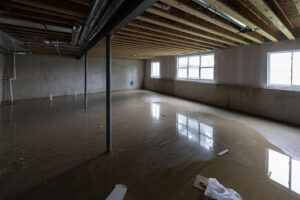Why Is Water in My Basement?

Basements are meant to stay dry, so if you’re noticing water issues—whether it’s large puddles or water-stained ceilings—something’s definitely not right. There are several possible causes, and it’s important to address them before they lead to bigger problems. Let’s break down some common culprits, what can happen if they’re not fixed, and how to prevent them in the future!
Possible Reasons Why Water Is in Your Basement
Water can sneak into your basement in all sorts of ways. Some of these ways include the following:
- Foundation cracks in basement walls and floors allow water seepage. This is much more likely to happen during heavy rain.
- A poorly designed drainage system causes surface water to pool around the home’s foundation and cause water intrusion.
- Clogged or damaged gutters and downspouts create standing water, which can seep into window wells and enter your basement.
- Hydrostatic pressure forces moisture through the foundation wall, eventually resulting in a wet basement.
- An improperly installed or neglected basement waterproofing system fails to prevent water leaks.
- A lack of proper grading around your property can cause rain runoff to accumulate near the basement and enter through small cracks.
- Plumbing leaks from plumbing fixtures, water lines, or sewer lines can cause hidden damage inside your basement.
Ways You Can Prevent Water From Entering Your Basement
While there are many ways water can find its way into your basement, there are, fortunately, many solutions and countermeasures you can employ before any flooding or leaks have a chance to happen. A few methods you should consider if you haven’t already include:
- Installing a sump pump in a sump pit helps remove water and prevent basement flooding.
- Routine cleaning and maintenance of gutters and downspouts help divert rainwater away and keep your basement dry.
- Applying waterproof coatings and sealants to the foundation wall can protect against water intrusion.
- Grading your landscape with a gentle slope directs runoff away from the basement.
- A properly designed basement waterproofing system channels excess moisture away from the home.
- Installing a backwater valve helps protect against sewage backup during wet weather and power outages.
- Checking for and fixing leaks in water lines and pipes reduces the risk of unexpected water damage.
- Covering window wells prevents rainwater from pooling and entering the basement.
What Happens When Water Soaks Your Basement
Waterproofing your basement and taking the other precautions listed above can save your home in more ways than one. If you need even more of an incentive to protect your basement, here are several possible issues that water damage can cause:
- Mold growth spreads quickly in a flooded basement, releasing unpleasant odors and harmful allergens.
- Basement flooding can weaken walls and the basement floor and lead to costly foundation repair.
- Water reaching electrical outlets and wiring can create serious safety hazards.
- Stored belongings, furniture, and appliances in a wet basement can sustain irreparable harm.
- Excess moisture attracts pests and contributes to the gradual deterioration of your home’s foundation.
- A failing floor drain may lead to basement backups that worsen existing problems.
- Water staining on the basement walls can incur long-term damage.
Call All Clear Drain Cleaning for Professional Plumbing Repairs and Other Services
If your basement has a plumbing issue, we can help! All Clear Drain Cleaning offers professional plumbing repairs in Edison, as well as other plumbing services so our customers can quickly solve pipe problems and keep their homes safe. Reach out today to learn more about our plumbing services and to schedule an appointment!
